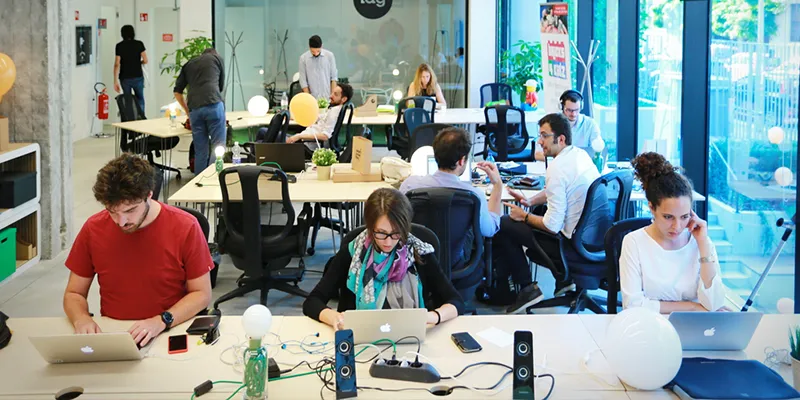Why are larger companies now opting for coworking spaces?
It’s no secret that the needs of the millennial workforce have drastically shifted away from those of previous generations. Today large enterprises have several teams operating from shared workspaces, infusing fresh energy and direction to their culture.
Coworking spaces have rapidly grown from their humble origins—mostly catering to freelance professionals and startup businesses—to attracting the biggest of enterprises today. The most interesting aspect of this transformation is that it is mostly the enterprises and large teams that have had to adapt to the coworking revolution and not the other way around, as is usually the case with business giants.

Nowadays, enterprises like Amazon, Dell, and more have several teams operating from shared workspaces, infusing fresh energy and direction to their culture.
Let’s take a look at six reasons why enterprises are increasingly adopting the coworking model:
Reduce overhead expenses
Capital expenditure (CAPEX) costs are those associated with fixed assets, often factored as long term and inflexible – such as the purchase of office spaces. Of course, only an empty building with limited infrastructure is insufficient to house an enterprise team, and hence the additional costs of turning it into an ideal environment for employees need to be factored in. Furnishing, HVAC, plumbing, etc., need to be accounted for and can take away a big chunk from the capital available for growing the business itself.
Meanwhile, operational expenditure (OPEX) costs refer to those involved in maintaining assets and catering to daily needs. In addition to actual material costs, this includes salaries paid to maintenance staff, utility bills and more, which the enterprise teams have to account for. All these can be minimised when large companies move to a coworking space.
A coworking space delivers cost-effective solutions for expanding as well as well-established teams. If that’s not all, coworking spaces also offer customisation where the client gets the best of both worlds - a space that offers privacy and their own culture and common areas to foster collaborations, partnerships, or just unwind after a routine day at work.
A community of like-minded individuals
It’s no secret that the needs of the millennial workforce have drastically shifted away from those of previous generations. As per the Deloitte Global Millennial Survey 2019, 47 percent of millennials aspire to make a positive impact on communities. Nearly 15 percent are dissatisfied with the work culture. Forty-nine percent of the millennials would, if they had a choice, quit their current jobs in the next two years.
As per the survey, to keep their employees motivated, companies must focus on learning and knowledge-based workshops, emphasise on inclusion as well as diversity in the workplace, and focus on enriching the lives of their employees. Coworking spaces provide an environment that caters to all of the above areas.
Coworking spaces organise several events for employee upskilling. We at 91springboard organise as many as 350 events per month across our 26 hubs ranging from learning and knowledge-based events to unwind sessions. Community is a part of our DNA and we offer an inclusive environment for all kinds of businesses - be it startups, SMEs, or large enterprise. This enables employees from large enterprise teams to interact and learn from people from all walks of life.
Balance of privacy and networking
While it is true that open spaces tend to be more active and buzzing, they are a great source of growing one’s network as well. Members can always choose to book their space in a private cabin, which ensures their privacy but at the same time make the most of the opportunities at a coworking space.
This is especially applicable to enterprises that would like to safeguard their privacy but at the same time need to stay abreast of innovation that are happening across sectors. In a dynamic era where the market is constantly evolving, it is important to be aware of new-age businesses and innovations happening in the industry and a coworking space facilitates this rapid and easy exchange of information. Shared workspaces are the perfect platform for large organisations to keep in touch with the pulse of the market.
Meaningful business partnerships
Coworking spaces offer more than just spaces. Many coworking spaces have tie-ups with service providers that help in streamlining business operations, aid productivity, and assist with employee programmes. These tie-ups are of all kinds ranging from HR services, travel and employee accommodation, legal help and much more. What’s interesting is that most of these value-adds are free. For example, some enterprise teams travel to different locations for meetings, etc., as a key part of their routine. These organizations can subscribe to a travel partner at discounted rates. Similarly, if an enterprise team is looking for an insurance plan for its employees, this can be facilitated by the coworking space.
Access to innovative ideas
Enterprise businesses are constantly exploring new avenues of growth – whether it be in a new geographic market, department, or simply furthering innovation on existing products. This requires that teams engaged in such projects deviate from standard thinking to find out-of-the-box ideas and methods that fit local markets.
In such cases, it can be a risk to make heavy investments into large assets – whether it’s local office space or long-term commitments that tie the organisation down. This is where several enterprises have chosen the coworking route, providing affordability without any compromise on the quality of experience they would like for their employees or clientele.
In fact, teams working out of shared spaces are more likely to participate in the exchange of ideas outside their organisation, perhaps inspiring the next breakthrough for the enterprise.
24x7 access
Coworking spaces are generally accessible round the clock with facilities like a cafeteria, game and break-out zones, nap rooms, etc. This allows companies that burn the midnight oil to keep their employees motivated. The employees are more productive and energetic through their work schedules in a coworking space.
Coworking spaces are evolving with customer’s needs to help them feel at home, enjoy the vibrancy of the space, collaborate and learn from their peers, and ultimately increase their productivity and overall happiness.
(Edited by Evelyn Ratnakumar)
(Disclaimer: The views and opinions expressed in this article are those of the author and do not necessarily reflect the views of YourStory.)








